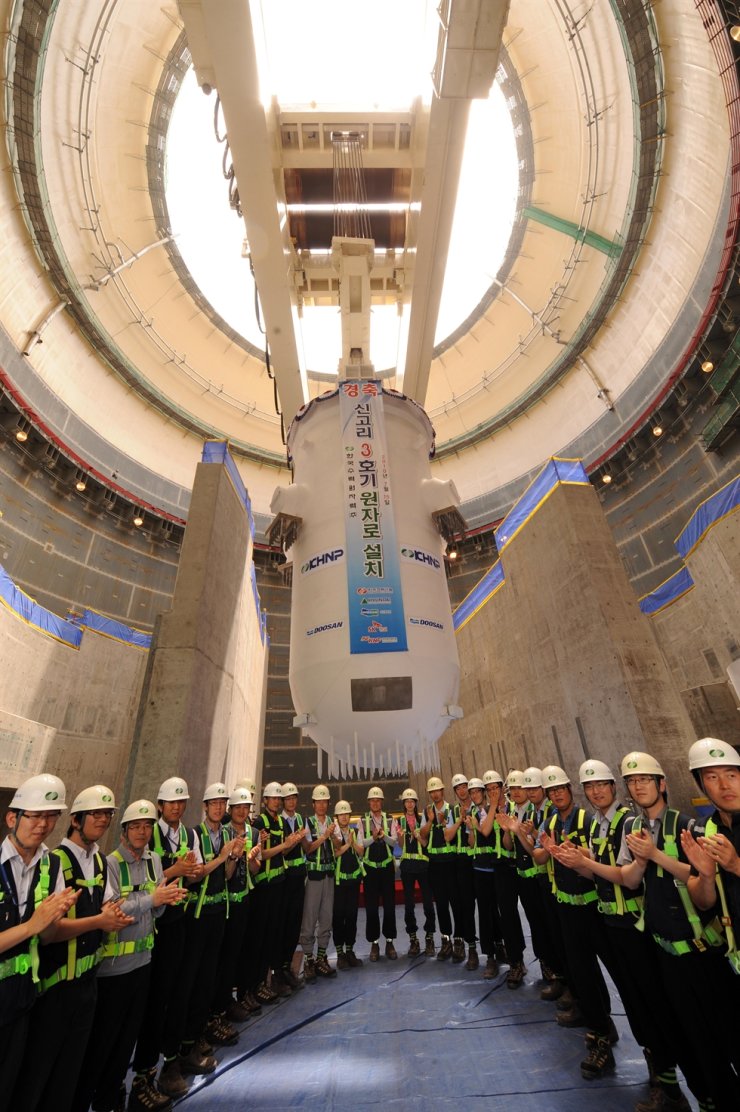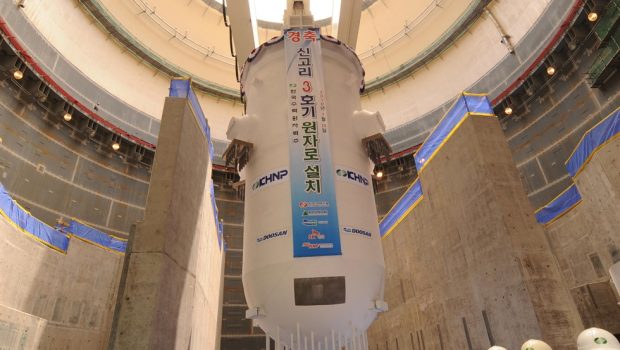 |
| Employees of Korea Hydro and Nuclear Power celebrate the installation of an APR-1400 reactor at Shin Kori Unit 3, a Korea-developed nuclear power plant, in Ulju, Ulsan Metropolitan City, July 15, 2010. Korea Times file |
Westinghouse suspected of undermining Korea's high-quality, cost-effective products
By Lee Kyung-min
Korea will have to navigate a number of unexpected obstacles in its efforts to win overseas nuclear power plant construction orders, market watchers said, Sunday.
They said the Asian country, which scrapped a nuclear phase-out policy pursued by the former presidential administration, will face political and diplomatic obstacles irrelevant to cost, quality and commercial viability ― areas where Korea maintains a high level of competitiveness over its advanced global peers.
Such concerns are amplified by the U.S. Inflation Reduction Act (IRA), which is viewed as biased by denying or curtailing tax credits on electric vehicles (EVs) that were not assembled within the U.S. or use batteries that contain at least a percentage of key minerals mined or processed in the U.S. or countries that signed free trade agreement with America.
The unexpected legislation to drum up support for the Biden administration and U.S. Democrats has spooked Korean EV and battery manufacturers and emerged as the top diplomatic issue for Korea's trade authorities.
Some say, however, that the consequences of any last-minute attempt to undermine Korea's nuclear power plant deals will not have a major impact on the domestic industry. This is because Korea and the U.S. have long maintained cooperation in the area, followed by bilateral agreements whereby Korea's technological independence is guaranteed in detail.
A recent lawsuit filed by Westinghouse Electric Company of the U.S. against its key competitors, Korea Hydro and Nuclear Power (KHNP) and Korea Electric Power Corp. (KEPCO) citing violations of intellectual property rights, is the latest case of the U.S. blocking a Korean nuclear power plant deal.
'US threatened'
"The U.S. is obviously threatened," said Lee Jong-ho, a senior researcher at the Nuclear Research Institute for Future Technology Policy (NIFTEP) associated with Seoul National University. He is also the former head of Korea Hydro and Nuclear Power's (KHNP) technology and engineering division.
The rapid growth of Korea's nuclear energy technology is making its advanced global peers feel increasingly nervous, in his view, especially Westinghouse, which was once the top player that few people these days associate with the capability of constructing and operating nuclear facilities.
Westinghouse says state-run KHNP and KEPCO must obtain approvals from the U.S. company and Department of Energy to export APR-1400 reactors. The APR-1400 reactor was developed by Korea using key Westinghouse technologies.
But Lee said the claims of intellectual property violations go against a license agreement between KEPCO and the U.S. firm signed in 1997, a process he oversaw at the time.
"The bone of contention was IP rights," he said.
Unlike patents, IP rights had no fixed expiration date, a reason why he determined that it was better to pay Westinghouse a certain fee for using its IP rights involving the APR-1400, instead of seeking full autonomy in using the technology for business purposes.
The APR-1400 technologies that was based on System80+, a reactor designed by Westinghouse, were developed by Korean firms, he said. Included were core nuclear power plant design codes, reactor cooling pumps and digital control systems, key information Westinghouse refused to share, but Korea was able to identify through years of industrial and academic cooperation by the mid-2010s.
"We signed an agreement to ensure the free and permanent use of Korea's APR-1400 technologies. The U.S. firm demanding approval therefore is in clear violation of the earlier agreement," Lee said.
Poland
The latest example of an export bid by Korea being complicated by political factors is a recently signed agreement whereby Korea will build up to four nuclear reactors in Patnow, Poland, in a private-sector-led project to establish what the European country characterized as "cheaper, more sustainable sources of power."
The Oct. 31 agreement was largely brushed off as a less-important project by many local media outlets, since Poland had chosen Westinghouse over KHNP on Oct. 28 (local time) to lead the government-led construction of its first nuclear power plant.
However, experts say Poland was extremely masterful in securing both diplomatic and economic interests, without generating friction with either.
Poland avoided jeopardizing its alliance with the U.S. solidified by the North Atlantic Treaty Organization (NATO), an intergovernmental military alliance among 30 member states, which has become critical in the midst of the Russian invasion of Ukraine.
At the same time, the European country is highly vulnerable to a winter energy crisis, and will be able to build nuclear plants with the help of Korea.
"Poland lost nothing through the recent deal," Lee said.
"Korea's system is 30 percent lower in price compared to ones made by France, for example. Korea is the only non-U.S. country that passed the U.S. screening for safety. The safe and efficient management of the facilities can and will be recognized more widely across the world in the years to come," he added.









Gloss